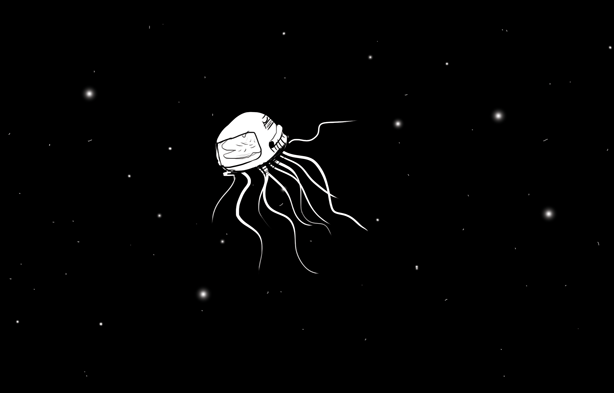By Dessa Bayrock (The Cascade) – Email
Print Edition: October 16, 2013

Somewhere among the freeze-dried food and extra space suits, NASA found room for live jellyfish on a trip to space.
It might seem like an odd choice, but the decision to bring the floppy sea creatures along was actually kind of brilliant, summed up in two words: gravity receptors.
Or, to make it sound even more like science fiction than it already does, graviceptors.
Let’s back up. Picture a jellyfish for a second.
You probably envision a floating, gently glowing mass, both delicate and terrifying, an odd combination of chiffon, jello, and tentacles.
Lacking spines (or, really, bones of any kind), jellyfish depend on the water around them to give them shape. Add this to the fact that jellyfish weigh so little, and you find yourself with a nearly weightless creature.
So what happens when you take a creature that is used to being nearly weightless and introduce it to an environment where it’s totally weightless?
This is where we get to the gravity receptors.
People have a structure in the inner ear that regulates balance and movement, relaying information to the senses to tell the brain just how fast everything is moving and how to respond. This structure—the vestibular system—is responsible for telling the body when to be dizzy and basically keeps all of humanity upright on a daily basis.
It turns out that jellyfish have something similar, which scientists have dubbed gravity receptors. NASA describes them as “microscopic fingers” surrounded by calcium crystals called statoliths. Together, the gravity receptors and statoliths tell the jellyfish what direction it’s facing and whether it’s pointing up or down.
Calcium crystals also form part of the human vestibular system, and although NASA researchers would love to look at some to see how they’re affected by a weightless environment, the crystals aren’t exactly easily accessible for study.
Ergo, jellyfish.
Because the crystals are fairly similar in both humans and jellies, packing a few jellyfish into space became the most elegant solution to the problem. As a bonus, jellyfish grow from infancy to maturity in a matter of days; NASA would not only see how the crystals were affected by weightlessness, but also if they form at all in a creature that has never known gravity – something definitely not possible with a human subject.
The result? Jellyfish that grew up in space formed the same graviceptors as Earth-grown jellies, but significantly fewer statoliths. Jellyfish just didn’t need the crystals in space, where facing in any direction feels exactly the same to both jellyfish and humans. Distinguishing between up and down becomes not only impossible, but unnecessary.
Unfortunately for the jellyfish, this meant that returning to Earth was more than a little confusing. Without the crystals—or, really, any understanding of gravity at all—figuring out how to pulse like a normal jellyfish was really, really hard.
Although it’s a sad ending for the jellies, the NASA researchers found out exactly what they wanted to know. Ground-grown jellyfish (crystals and all) could adapt to a gravity-free environment, and probably could have adapted back again if they’d lived long enough – just like humans. The space-born jellies, on the other hand, while able to move about the weightless environment, couldn’t figure out how to live with gravity after their initial development left them without statoliths. Logically, the same would be true for humankind – any people born in space would stand a good chance of being totally baffled by gravity should they ever return to Earth.


